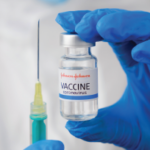
Lia Kos / shutterstock.com
Although more than 189,300,000 eligible Americans are fully vaccinated against SARS-CoV-2 as of Oct. 18, 2021, vaccine hesitancy persists.1 The U.S. Centers for Disease Control and Prevention (CDC), citing data from the U.S. Census Bureau’s Household Pulse Survey collected between May 26 and June 7, 2021, reports that in some U.S. counties—particularly in the Southeast and Northwest—between 21% and 26.7% of eligible adults said they were “vaccine hesitant.”2
Percentages are far lower in such areas as Southern California, between 6% and 9%. But rheumatologist Daniel G. Arkfeld, MD, says up to one-quarter of the patients at his clinic in Los Angeles are still hesitant to be vaccinated against COVID-19.
“It’s been interesting. They’re arguing with me not to get the vaccine, and I’m trying to convince them to get it,” says Dr. Arkfeld, associate professor of clinical medicine at the Keck School of Medicine, University of Southern California. “The misinformation about vaccines that is out there in the public is big. I do what I can to reason with patients, but some are adamantly opposed to the vaccines.”
Persistent Resistance
 Although Dr. Arkfeld explains the benefits of the vaccines (i.e., to both prevent COVID-19 infection and limit more severe symptoms), some of his patients fear allergic reactions or a disease flare from the vaccine. Others tell him the media exaggerates COVID-19 death rates.
Although Dr. Arkfeld explains the benefits of the vaccines (i.e., to both prevent COVID-19 infection and limit more severe symptoms), some of his patients fear allergic reactions or a disease flare from the vaccine. Others tell him the media exaggerates COVID-19 death rates.
“Some patients wanted to wait until the new vaccines were FDA approved. But when they were approved, [these patients] still wouldn’t [get vaccinated]. Some people even become angry or agitated if you try to convince them to get a vaccine,” he says.
Vaccine misinformation is widespread on social media platforms, such as Facebook, Instagram and Twitter, says Ann Marie Pettis, RN, president of the Association for Professionals in Infection Control and Epidemiology and director of infection prevention for the University of Rochester Medicine, Rochester, N.Y.
 “Patients are greatly influenced by what they hear from friends and relatives, and what they see on TV and social media—each with their own biases that distort the fact that the Covid-19 vaccines are safe, effective and free,” Ms. Pettis says. “Instead, patients should put their trust in their healthcare professionals, who understand germ-caused diseases and how to prevent them. We know that the vaccine works and that Covid-19 kills, so the more of us who get vaccinated, the less chance there is for new variants to emerge, and the quicker we can all get our normal lives back.”
“Patients are greatly influenced by what they hear from friends and relatives, and what they see on TV and social media—each with their own biases that distort the fact that the Covid-19 vaccines are safe, effective and free,” Ms. Pettis says. “Instead, patients should put their trust in their healthcare professionals, who understand germ-caused diseases and how to prevent them. We know that the vaccine works and that Covid-19 kills, so the more of us who get vaccinated, the less chance there is for new variants to emerge, and the quicker we can all get our normal lives back.”
Dr. Arkfeld says he finds the ACR’s COVID-19 Vaccine Clinical Guidance Summary for Patients with Rheumatic and Musculoskeletal Diseases helpful when he explains vaccine efficacy or risk of flare to patients on immunomodulatory therapies.
Also to help with conversations with patients, The Rheumatologist has created a printable, one-page handout on common COVID-19 vaccine myths and facts that rheumatologists and clinical staff can share and discuss with patients.
Susan Bernstein is a freelance journalist based in Atlanta.



